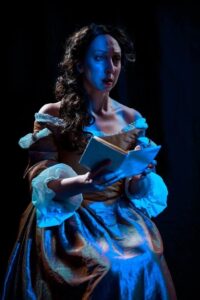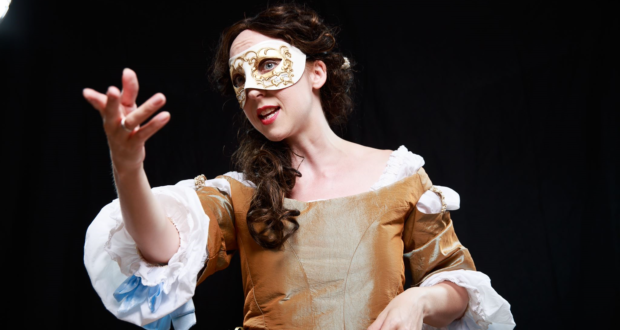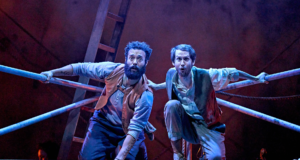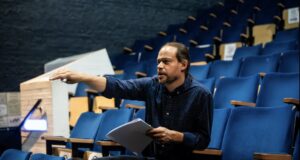Claire Louise Amias tells us about Aphra Behn
In early 2023 Claire Louise Amias will be touring her show about Aphra Behn, the UK’s first professional female writer. We caught up with Claire to learn a little more about this fascinating historical figure and to talk about how her story will be brought to life in The Masks of Aphra Behn.
So, let’s start with the obvious question, who was Aphra Behn?
Aphra Behn was arguably the first professional female writer in English. She wrote plays, poetry and prose. Her most well-known works today are her play The Rover and novella Oroonoko. She was born in 1640 and grew up in Canterbury, the daughter of a barber and a wet nurse, but ended up one of the most prolific writers of the Restoration era. Before becoming a writer, she worked as a spy for King Charles II in the Second Dutch War. A lot of her life story is unknown as she wasn’t aristocratic. However, she was part of the same libertine literary set that included the Earl of Rochester.
She’s mentioned in Virginia Woolf’s book A Room of One’s Own: “All women together ought to let flowers fall upon the tomb of Aphra Behn … for it was she who earned them the right to speak their minds.”
What first brought Aphra Behn to your attention then?

Photo by: Claire Newman-Williams
I first came across her when I read The Rover in my twenties. I loved the play and directed some scenes from it with my acting students. It wasn’t until I did an MA at RADA that she came up again. We were doing a workshop on Restoration Theatre and my tutor, Andrew Visnevski, threw down the gauntlet by saying he’d never seen a one-woman show about Aphra Behn and that one of us should create one. I wanted to create it for my final piece on the MA, but after reading all of her plays, and a lot of her poetry and prose and three biographies, I got rather bogged down with too much information! However, I was drawn to the character of this vibrant libertine woman who achieved so much in the arts at a time when, because of her sex and class, it was nearly impossible to do so. What emerged was this enigmatic and engaging personality who, to survive, adapted to whatever situation she was in. To carry on exploring her work, I directed scenes from her plays and a rehearsed reading of The Lucky Chance at RADA.
Five years later, in 2016, the opportunity to take part in the Women and War Festival at London’s So & So Arts Club came up. I realised the way to create the one-woman show was to pick one particular part of Behn’s life to focus on – and it so happened that her time as a spy in the Dutch wars was the best documented. As soon as I had the concept I wrote the show quite quickly. It was accepted for a four-week run at the Women and War Festival, then at the RADA Festival, and it went on a national tour, getting lots of four-star reviews. Pradeep Jey directed it – he’s co-artistic director of our theatre company, A Monkey with Cymbals, which we set up in 2009. We have a good working relationship, and a close enough friendship that we’re able to really challenge each other and our artistic choices.
You’ve performed The Masks of Aphra Behn since 2016, there was a live-stream during lockdown and now you are playing a mini tour in 2023. What is it that keeps bringing you back to her story?
I’ve decided to bring back my one woman show about her now because there’s currently a campaign to get a statue built to commemorate Behn, run by the The A is for Aphra Campaign and the Canterbury Commemoration Society. So the subject is very topical.

Photo by: Greg Veit
You must have done extensive research of Aphra Behn’s poetry, letters and plays?
Yes, as I mentioned, it took a few years of research to write The Masks of Aphra Behn. My final project at RADA ended up being a dramaturgical anthology of scenes from Behn’s plays, plus bits from her poems and letters, which included autobiographical references to her life. I’m not sure if it was in itself a great piece of theatre, but it certainly gave me a foundation for writing The Masks of Aphra Behn. This helped give me a sense of her voice, so that her letters and introductions to her plays, and even a section from the opening of Oroonoko (which was thought by early biographers to be based on her own history), seamlessly flow into the lines I’ve written.
It gives the show a sense of authenticity by containing some of Behn’s own words
Tell us a little more about the A is for Aphra campaign.
The A is for Aphra Campaign has a similar goal to my own. Aphra Behn achieved an extraordinary body of work and remains an important historical figure, yet she’s not a well-known name.
The campaign organisers aim to have her celebrated publicly, and they’ve joined forces with the Canterbury Commemoration Society to get a bronze statue of this incredible woman erected in her hometown of Canterbury.
When I saw that this campaign had launched on social media, I felt I had to get in touch. They’ve kindly promoted my show in their newsletters, and after each performance I suggest people donate to the A is for Aphra Campaign to raise funds for the statue.
What would you like audiences to take away from your show?
I’d like people to come away from the show knowing a bit about this amazing woman, and to be intrigued enough to read or watch more of her plays, and to be inspired by her tenacity and talent. And to listen to her sometimes very modern thoughts on sexual politics and her satirical take on the position of women in society.
I’ve also attempted to write my show in the style of how I imagine Behn might have written her own life story, full of adventure, humour and pathos, so I hope the audience are entertained!
What are your plans after the tour? We know you have been developing Woman Behind Glass – might we see that in 2023?
I’m getting close to a draft of Woman Behind Glass that I’m happy with. It’s a ghost story that also touches on the subject of dementia. I’m a fan of MR James and the ghost stories of E Nesbit, and the play deals with a supernatural presence that’s possibly an emanation of past and present human trauma. Again, it’s an idea I’ve been playing with for a while. I always need a gestation period where the ideas formulate. Pradeep and I previously received an ACE grant for an R&D project about memory and photography, and this is certainly a development of that idea. We hope to apply for further funding this year. So, watch this space!
Thanks to Claire for chatting with us and look for our review of The Masks of Aphra Behn soon. You can visit Claire’s website here and find her on Twitter here.
The Masks of Aphra Behn plays at:
White Bear Theatre January 11-13. Tickets and more information can be found here.
The Space February 17 & 18. Tickets and more information can be found here.
The Brooke Theatre February 22. Tickets and more information can be found here.
 Everything Theatre Reviews, interviews and news for theatre lovers, London and beyond
Everything Theatre Reviews, interviews and news for theatre lovers, London and beyond



